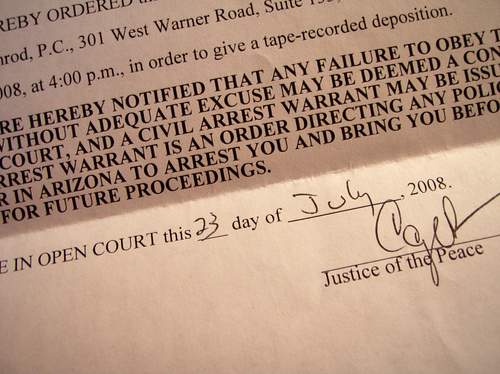What is a Subpoena?
A subpoena is a legal document, often times delivered to an individual by a process server. It is a court order requiring that person to appear at a specific date and time to testify as a witness for a case.
The subpoena should inform the served individual of the parties involved, the date and time they should arrive, the place to appear at, the type of court the lawsuit is taking place at, and the name of the person/lawyer who issued the subpoena.
In some cases, the person receiving the subpoena may be asked to bring documents with them. If so, they should be described somewhere on the subpoena or on a separate paper given with the subpoena.
Why Would You Need a Subpoena?
If you are proceeding with a lawsuit, wouldn?t you want to have as many key witnesses and as much documentation needed to support your case? No court is going to automatically take your word for it without some backing especially if the opposing party has items to support their argument.
What if someone will not come to court in your defense? Or will not release supporting documents you need to prove your case? Then what? If you really believe you are in the right, you are not going to shrug your shoulders and say, ?Oh well!?
A subpoena will inform the witness that they have to come to court. It can also tell that person to bring certain documents. They must comply. If they do not, they may be found in contempt of court. This may result in a jail term for them as well as force them to pay compensation fees to those who may have been damaged by their failure to appear (YOU!).
Preparing a Subpoena
There are several types of subpoena forms that can be downloaded online from your state?s court website or obtained from your local court clerk. Fill this out with the complete name of the individual you want to appear in court. If you need them to bring documents, list out the exact documents.
You may want to include detail on the documents to be sure they bring exactly what you need. (The last page of the subpoena should be left blank as you will need to fill this out after they have been served.)
Take your subpoena to the clerk at the court. S/he will look it over and verify everything is correct. S/he will sign and stamp your subpoena. Make copies of the subpoena – one to be served to the individual and one to keep on hand just to be safe.
Now, you will need to serve your subpoena. This can be done by a sheriff or law official. Or it can be done by a local process serving company. Remember, you will want to have the copy of the subpoena served. Keep the original signed and stamped subpoena! JPL Process Service can help you serve your subpoena anywhere in California, specializing in Orange County and Los Angeles county.
The last page of the original subpoena is titled ?Proof of Service for Personal Appearance and Production of Documents and Things at Trial or Hearing and Declaration? page. Once the subpoena has been served, you are free to fill this out. The process server (or the person who served the subpoena) needs to sign at the bottom of this page. Take the completed last page of the original subpoena back to the court clerk prior to your hearing.
In some instances, the witness can ask for payment for showing up for your trial.? California Court Laws states that they may ask for $35 a day and 20 cents a mile (each way). You should be prepared to pay these fees.
If they ask for payment prior to your court date and you refuse to pay, they are no longer obligated to show up or bring documentation. However, if they do not ask for payment then you are not required to offer anything. Do bring money with you on your court date just in case they do ask then.
Now you know the basics of a subpoena and why you may need one!

When the time comes, JPL Process Service can assist you in serving your subpoena as well as any other legal documents you may need served.? We have offices throughout Southern California, including:
- Orange County
- Los Angeles County
- Riverside County
- San Bernardino County
- San Diego County
- Santa Barbara County
- Ventura County
Give us a call at (866) 754-0520.
For more information, you can also check us out on Facebook, Twitter or LinkedIn or this list of frequently asked questions.

